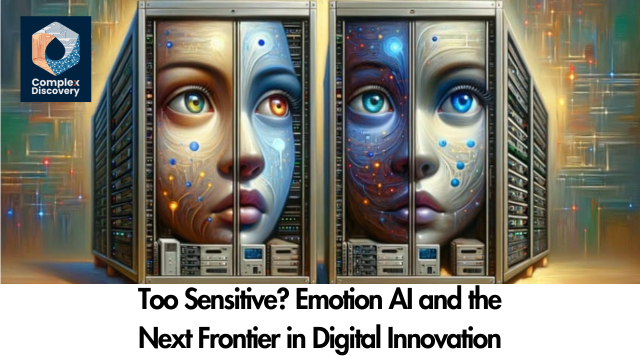 Image: Rob Robinson, ComplexDiscovery with AI.
Image: Rob Robinson, ComplexDiscovery with AI.
[EDRM Editor’s Note: This article was first published here on April 2, 2024, and EDRM is grateful to Rob Robinson, Editor and Managing Director of ComplexDiscovery, for permission to republish.]

ComplexDiscovery Editor’s Note: In this compelling piece, the ComplexDiscovery OÜ team delves into the revolutionary field of Emotion AI, heralded as the next frontier in digital innovation and the evolution of digital identities. As technology continues to intertwine more deeply with human experiences, the European Institute of Technology (EIT Digital), under the leadership of CEO Federico Menna, stands at the cusp of this transformative wave. This exploration highlights the groundbreaking developments in Emotion AI and underlines the ethical imperatives and societal impacts these technologies bring to the fore. For professionals in cybersecurity, information governance, and eDiscovery, understanding the trajectory of Emotion AI is crucial. It not only shapes the landscape of digital interactions and security but also emphasizes the importance of responsible innovation in the digital age. As we navigate through these changes, the insights shared by industry leaders like Menna and Karen Burns offer a glimpse into the future of digital identities and the role of ethical considerations in shaping a more inclusive and empathetic digital world.
Generative AI and the burgeoning world of digital identities are taking center stage in technological innovation, promising transformative impacts on society and economies globally. At the forefront stands the European Institute of Technology (EIT Digital), led by CEO Federico Menna, who, in an interview with the Athens-Macedonian News Agency (ANA-MPA), asserted that Emotion AI is set to become the next disruptive force, transcending the capabilities of Generative AI by detecting and responding to human emotions. This progression pushes the digital envelope further, reinforcing the premise that the digital age is far from over; it’s evolving.
At the forefront stands the European Institute ofTechnology (EIT Digital), led by CEO Federico Menna, who, in an interview with the Athens-Macedonian News Agency (ANA-MPA), asserted that Emotion AI is set to become the next disruptive force, transcending the capabilities of Generative AI by detecting and responding to human emotions.
Rob Robinson, ComplexDiscovery.
EIT Digital – Nurturing the Future of Innovation
Federico Menna’s full interview guarantees a promising future for Europe’s digital ventures, products, and services. With robust educational programs, EIT Digital arms students with digital entrepreneurship skills, embedding responsibility in technological advancement. Menna highlights partnerships with institutions like the Aristotle University of Thessaloniki and the ICCS at the National Technical University in Greece, reflecting the institute’s commitment to fostering talent and bridging the digital divide across different regions.
Through initiatives such as the Venture Program and the (d)Academy, EIT Digital is investing in strategic sectors, combating societal challenges like poverty and inequality. The story of Ozzie Robotics from Greece exemplifies this, showcasing how advanced caregiver AI supports the elderly, reflecting EIT Digital’s vision of inclusive tech benefits. Menna underscores a critical facet of digital transformation: the development of digital work environments powered by AI literacy and data competency, among other essential skills.
In parallel, Karen Burns, co-founder and CEO of Fyma, told The Center for Data Innovation how AI analytics can extract rich behavioral data from video streams, a leap forward in digital monitoring tools. Pioneered in London, New York, and Tallinn, Fyma aptly demonstrates the revolutionary potential of AI in redefining practical solutions, especially in retail operation analysis. The company’s success story is partly thanks to Estonia’s vibrant start-up ecosystem.
Apart from AI, nations are reimagining identity through digital means, as detailed in an article by TechRadarPro. The paradigm shift to digital identities promises significant convenience and security for individuals. Estonia emerges as a leader in this arena, its e-identity program lauded across the globe, while countries like India champion the largest national digital identification efforts.
Evolving Relationships with Technology
The emergence of high-powered, sensitive technologies like Emotion AI presents an impetus to rethink the relationship with digital tools. As Menna and Burns demonstrate, ethical considerations remain paramount in creating solutions with societal impact. Data-driven solutions are driving progress, with digital identities modernizing access and transactions—though the onus falls on global communities to ensure these innovations enhance, rather than infringe, on personal liberties.
Ultimately, the dialogue on technological evolution is complex and far-reaching, with Europe and startups like Fyma playing pivotal roles in crafting responsible yet progressive pathways forward. Digital identities, alongside Emotion AI, forecast a future where personal experience and digital interaction are more intricately interwoven than ever before, offering a unique perspective on the dynamic relationship between technology and society.
The Potential and Challenges of Emotion AI
As Emotion AI emerges as the next frontier in digital innovation, it holds immense potential to accelerate the evolution of various sectors, from healthcare and education to marketing and customer service. By enabling machines to recognize, interpret, and respond to human emotions, Emotion AI can lead to more personalized and empathetic interactions between humans and technology.
However, the development and deployment of Emotion AI also raise significant ethical and privacy concerns. The ability to detect and analyze human emotions at scale could be misused for manipulation or surveillance purposes, undermining individual autonomy and privacy rights. Therefore, it is crucial for companies and researchers working on Emotion AI to prioritize ethical principles and ensure that the technology is developed and used responsibly.
News Sources
Additional Reading
 Image: Rob Robinson, ComplexDiscovery with AI.
Image: Rob Robinson, ComplexDiscovery with AI.